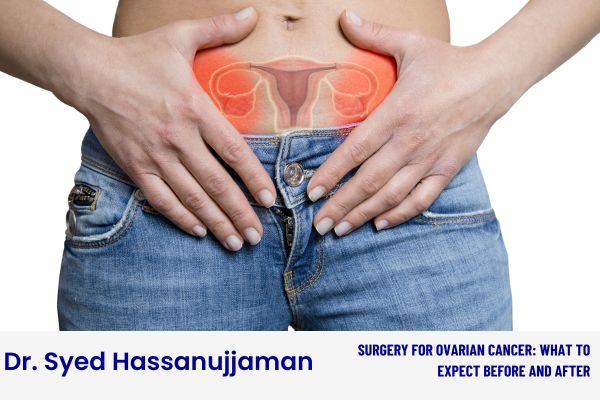Surgery for Ovarian Cancer
Surgery is a crucial part of ovarian cancer treatment, often combined with chemotherapy or other therapies. Understanding the process before and after surgery can help ease anxiety and improve recovery. In this blog, Dr. Syed Hassanujjaman, a leading cancer specialist, explains the types of ovarian cancer surgeries, pre-surgery preparations, what happens during the procedure, and post-operative care to ensure a smoother recovery.
Surgery for Ovarian Cancer: What to Expect Before and After
Insights from Dr. Syed Hassanujjaman
Introduction
Ovarian cancer is one of the most challenging cancers to detect early. By the time it is diagnosed, surgery often becomes a necessary step to remove the tumor and affected tissues. Dr. Syed Hassanujjaman, an expert in cancer care, explains what patients should expect before, during, and after ovarian cancer surgery, helping them prepare for a smoother treatment journey.
Types of Ovarian Cancer Surgery
The type of surgery depends on the stage of cancer and whether it has spread beyond the ovaries. The most common procedures include:
1. Total Hysterectomy with Bilateral Salpingo-Oophorectomy
- Removal of the uterus, both ovaries, and fallopian tubes.
- Recommended for advanced ovarian cancer cases.
2. Debulking Surgery (Cytoreductive Surgery)
- Performed when the cancer has spread to other areas of the abdomen.
- The goal is to remove as much of the cancerous tissue as possible before chemotherapy.
3. Omentectomy
- Removal of the omentum, a fatty tissue layer where ovarian cancer often spreads.
4. Lymph Node Dissection
- Nearby lymph nodes are removed to check for cancer spread.
5. Fertility-Sparing Surgery
- If diagnosed in the early stages, a surgeon may remove only the affected ovary and fallopian tube, preserving fertility.
Pre-Surgery Preparation
Dr. Syed Hassanujjaman recommends the following steps before undergoing ovarian cancer surgery:
✔ Medical Evaluation: Blood tests, imaging scans, and heart function tests to determine overall health.
✔ Discussing Risks & Benefits: Understanding potential side effects and post-surgical expectations.
✔ Bowel Preparation: Special diet or laxatives may be required before surgery.
✔ Fasting: No food or drink for several hours before the procedure.
✔ Hospital Admission: You may need to stay in the hospital for 3–7 days depending on the complexity of the surgery.
During the Surgery
- The procedure is performed under general anesthesia.
- The duration of surgery can vary from 2 to 6 hours, depending on the extent of cancer spread.
- A laparotomy (open surgery) or laparoscopy (minimally invasive surgery) may be performed based on the patient’s condition.
- If necessary, additional organs or tissues may be removed to prevent further cancer spread.
Post-Surgery Recovery: What to Expect
1. Hospital Recovery
- Patients are closely monitored for any complications.
- Pain management is provided through medications.
- Catheters and drainage tubes may be placed temporarily.
- Most patients stay in the hospital for 3–7 days after major surgery.
2. At-Home Recovery
- Rest & Mobility: Avoid heavy lifting and strenuous activities. Light walking can help with circulation.
- Dietary Adjustments: Soft, nutritious foods rich in protein aid faster healing.
- Managing Side Effects: Fatigue, bloating, and mild discomfort are common but should gradually improve.
- Emotional Support: Dealing with a cancer diagnosis and surgery can be emotionally challenging. Counseling and support groups can help.
3. Follow-Up Care
- Regular check-ups with your oncologist to monitor recovery.
- Additional treatments such as chemotherapy or targeted therapy may be needed based on post-surgical findings.
- Any unusual symptoms like excessive bleeding, infection, or severe pain should be reported to your doctor immediately.
Conclusion
Surgery is a key part of ovarian cancer treatment, and preparing for it can make a significant difference in the recovery process. Dr. Syed Hassanujjaman emphasizes that while surgery can be challenging, proper guidance, post-operative care, and emotional support can help patients regain their health and well-being. If you or a loved one is facing ovarian cancer, consult with a specialist to explore the best treatment options for your case.
